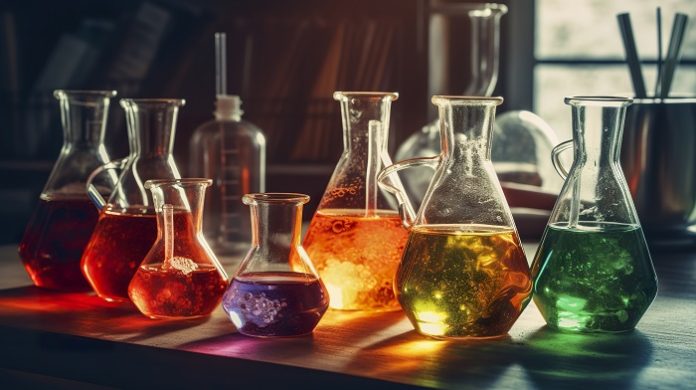“Speciality chemicals cater to a niche market and are often fine-tuned to meet the specific and unique demands of a customer application. GenAI has emerged as a powerful tool to take this customisation to new levels and provide more value to customers by delivering “precision chemicals”.
Precision Chemicals
T
he speciality chemicals segment represents 22% of India’s overall chemicals and petrochemicals market and is valued at $32 billion. It is projected to grow at 12% per year. Speciality chemicals account for more than half of India’s chemical exports.
Key Features
Several key features shape the competitive dynamics and growth opportunities in the speciality chemicals industry. These include a focus on innovation, customisation, technical expertise, customer relationships, global presence and commitment to regulatory compliance and sustainability.
Customisation
Speciality chemicals often serve niche markets or specific industries with unique needs. Customisation allows manufacturers to tailor their products to meet the precise requirements of their customers, whether it is related to performance, compatibility, regulatory compliance, or other factors. Different applications may require variations in chemical composition, concentration, or other properties to achieve optimal performance. Customisation enables manufacturers to fine-tune their products for maximum effectiveness in particular applications or environments. Offering customised solutions can be a significant competitive advantage in the speciality chemicals industry. It allows companies to differentiate themselves from competitors by providing tailored products that better address the needs of their customers, fostering stronger relationships and increasing customer loyalty.
Customer Satisfaction
Customisation provides flexibility to adapt to changing market demands, emerging trends, or technological advancements. It allows companies to quickly develop new formulations or modify existing ones to stay ahead of the curve and capitalise on new opportunities. By offering customised solutions, manufacturers can better align their products with the specific requirements and preferences of their customers. This leads to higher levels of customer satisfaction and loyalty, as clients appreciate products that are precisely tailored to their needs. Customised speciality chemicals often command higher prices compared to standard off-the-shelf products due to their tailored nature and enhanced performance. This enables manufacturers to capture more value from their products and increase profitability. Certain industries may have strict regulatory requirements regarding the composition, handling, or environmental impact of chemicals. Customisation allows manufacturers to ensure their products comply with relevant regulations and standards, minimising compliance risks for both themselves and their customers.
Sustainability – Key Differentiator
Sustainability is becoming a key battleground for differentiation in the speciality chemicals industry. Consumers are increasingly environmentally conscious and seek products made with sustainable practices. This translates to a demand for speciality chemicals that are bio-based, non-toxic, and biodegradable. Stricter regulations around environmental impact are pushing companies to adopt cleaner production methods and reduce emissions. Being ahead of the curve on sustainable practices can give a competitive edge. Sustainability often overlaps with resource efficiency. By optimising processes and using renewable resources, companies can reduce costs and waste, and improve their bottom line. By focusing on sustainability, speciality chemical companies can attract new customersby catering to the growing demand for eco-friendly products. They can boost brand reputation andposition themselves as responsible and environmentally conscious. They can future-proof theirbusiness and Become prepared for stricter regulations and resource scarcity.
Speciality chemical companies can achieve sustainability differentiation by different means. Adopting green chemistry principles like using renewable feedstocks, designing less hazardous chemicals, and minimising waste during production. Implementing a circular economy approach involves using recycled materials, designing products for recyclability, and developing closed-loop systems to minimise waste. Openly communicating sustainability efforts and achievements builds trust with environmentally conscious customers.Sustainability is not just an environmental responsibility, but a strategic opportunity for speciality chemical companies to differentiate themselves in a competitive market.
Generative AI
Generative AI has emerged as a powerful tool for customising speciality chemicals. By leveraging machine learning algorithms, GenAI can assist in optimising chemical formulations to enhance performance, stability, and other desired properties. It can explore a wide range of potential formulations, identify optimal combinations of ingredients, and suggest adjustments to achieve desired outcomes. Formulating speciality chemicals often involves combining various components to achieve the right balance of properties. AI can analyse data on existing formulations and their performance. It can then suggest new combinations of ingredients or ratios to achieve desired properties for a specific customer application. Lanxess uses AI to optimise the formulation of lubricants for industrial machinery. Their AI platform analyses data on existing lubricants, operating conditions, and desired wear reduction to recommend optimal formulations for specific customer needs.
Fine-tuning existing speciality chemicals for specific customer needs can be complex. AI can analyse vast datasets on existing chemicals, their properties, and customer requirements. It can then propose modifications to existing molecules to achieve the desired performance characteristics. Evonik utilises AI to optimise polymer properties for specific applications in the automotive industry. Their AI platform analyses data on existing polymers and desired automobile part functionalities to recommend modifications for enhanced performance, such as heat resistance or improved flexibility. GenAI can analyse customer data, including past purchases, usage patterns, and feedback, to generate personalised recommendations for speciality chemicals. By understanding each customer’s unique requirements and preferences, manufacturers can offer tailored solutions that better align with their needs.
Innovation
Traditionally, designing new molecules with specific properties is a time-consuming trial-and-error process.Generative AI models can create novel molecule structures based on desired functionalities or target applications. For example, a company might use GenAI to design a new flame retardant with specific thermal properties and environmental safety considerations.BASF has partnered with MIT to develop a GenAI platform called “Project AM – Alchemist’s Machine”. This platform uses machine learning to design new catalysts for chemical reactions, potentially leading to faster and more efficient production of customised speciality chemicals.
In addition to formulation customisation, GenAI can optimise manufacturing processes to ensure efficient production of customised speciality chemicals. It can identify opportunities for process improvement, minimise waste, and streamline operations to meet the demands of customised production runs. Clariant utilises GenAI to optimise dye production processes. GenAI analyses data on reaction pathways, catalyst effectiveness, and energy consumption. This allows for the development of greener dye production processes that minimise waste generation and energy use, contributing to a more sustainable textile industry. Top of FormDSM – the leading life sciences and materials company – uses GenAI to design sustainable bio-based materials. GenAI analyses data on the properties of natural materials and potential bio-based alternatives. This allows for the creation of eco-friendly alternatives to traditional petroleum-based materials, reducing the industry’s environmental footprint.
Epilogue
GenAI can optimise speciality chemical formulations, predict performance, and customise products for specific applications. It can analyse vast data sets to personalise recommendations, enhance R&D efficiency, and streamline manufacturing processes. GenAI can enable real-time adaptation, ensuring compliance, fostering innovation, and strengthening customer relationships, driving growth and competitiveness in the speciality chemicals industry.
































